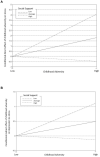Childhood adversity and late-life depression: moderated mediation model of stress and social support
- PMID: 37435403
- PMCID: PMC10331618
- DOI: 10.3389/fpsyt.2023.1183884
Childhood adversity and late-life depression: moderated mediation model of stress and social support
Abstract
Background: As life expectancy increases, understanding the mechanism for late-life depression and finding a crucial moderator becomes more important for mental health in older adults. Childhood adversity increases the risk of clinical depression even in old age. Based on the stress sensitivity theory and stress-buffering effects, stress would be a significant mediator, while social support can be a key moderator in the mediation pathways. However, few studies have tested this moderated mediation model with a sample of older adults. This study aims to reveal the association between childhood adversity and late-life depression in older adults, taking into consideration the effects of stress and social support.
Methods: This study used several path models to analyze the data from 622 elderly participants who were never diagnosed with clinical depression.
Results: We found that childhood adversity increases the odds ratio of depression by approximately 20% in older adults. Path model with mediation demonstrates that stress fully mediates the pathway from childhood adversity to late-life depression. Path model with moderated mediation also illustrates that social support significantly weakens the association between childhood adversity and perceived stress.
Conclusion: This study provides empirical evidence to reveal a more detailed mechanism for late-life depression. Specifically, this study identifies one crucial risk factor and one protective factor, stress and social support, respectively. This brings insight into prevention of late-life depression among those who have experienced childhood adversity.
Keywords: childhood adversity; depression; moderated mediation; older adults; path analysis; social support; stress.
Copyright © 2023 Lee, Lee, Chung, Park, Shin, Lee, Lim, Hwang, Urtnasan, Jo and Kim.
Conflict of interest statement
The authors declare that the research was conducted in the absence of any commercial or financial relationships that could be construed as a potential conflict of interest.
Figures


References
-
- Felitti VJ, Anda RF, Nordenberg D, Williamson DF, Spitz AM, Edwards V, et al. . Relationship of childhood abuse and household dysfunction to many of the leading causes of death in adults: the adverse childhood experiences (ACE) study. Am J Prev Med. (1998) 14:245–58. doi: 10.1016/S0749-3797(98)00017-8, PMID: - DOI - PubMed
-
- WHO . Preventing child maltreatment: a guide to taking action and generating evidence World Health Organization; (2006). Available at: https://apps.who.int/iris/handle/10665/43499
LinkOut - more resources
Full Text Sources
Research Materials

